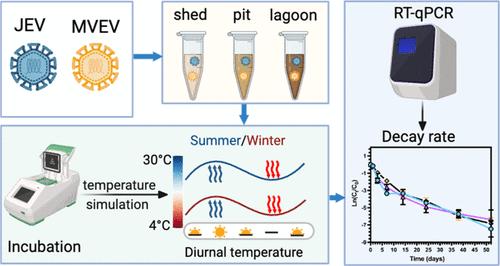The Effect of Diurnal Temperature Fluctuations on the Decay of Japanese Encephalitis and Murray Valley Encephalitis Virus RNA Seeded in Piggery Wastewater
引用次数: 0
Abstract
Japanese encephalitis virus (JEV) and the Murray Valley encephalitis virus (MVEV) are mosquito-borne pathogens capable of transmission from animals to humans, causing significant economic and public health impacts in affected countries. Pigs serve as amplifying hosts for JEV and potentially play a role in the natural ecology of MVEV. Reports of JEV viral shedding underscore the prospect of wastewater surveillance for early detection and intervention for animal and human health. To assess the feasibility of wastewater surveillance, the decay rates of JEV and MVEV RNA were determined under the simulated diurnal temperatures in summer and winter by seeding these viruses in piggery wastewater collected from three potential surveillance sites (shed, pit, and lagoon). During a 52-day experiment, a one log10 reduction in RNA copies was found for JEV within 24.8–36.4 days, while MVEV experienced a 90% reduction ranging from 15.5 to 24.4 days, which was significantly faster than that of JEV. Seasonal temperature and site-specific differences significantly influenced the RNA decay rates of both viruses in piggery wastewater samples. These data indicated the sufficient persistence of JEV and MVEV under diurnal temperatures in summer and winter conditions, which would facilitate surveillance of viruses in piggery environments.

昼夜温度波动对猪场废水中日本脑炎和墨累山谷脑炎病毒 RNA 降解的影响
日本脑炎病毒(JEV)和墨累谷脑炎病毒(MVEV)是蚊媒病原体,能够从动物传染给人类,对受影响国家的经济和公共卫生造成重大影响。猪是 JEV 的扩增宿主,并可能在 MVEV 的自然生态中发挥作用。有关 JEV 病毒脱落的报道强调了废水监测的前景,以便及早发现并干预动物和人类健康。为了评估废水监测的可行性,我们将 JEV 和 MVEV RNA 添加到从三个潜在监测点(猪舍、坑和泻湖)收集的猪舍废水中,在夏季和冬季模拟昼夜温度下测定了这些病毒的衰减率。在为期 52 天的实验中,JEV 的 RNA 拷贝在 24.8-36.4 天内减少了 1 log10,而 MVEV 在 15.5-24.4 天内减少了 90%,明显快于 JEV。季节性温度和特定地点的差异对猪场废水样本中两种病毒的 RNA 降解率都有显著影响。这些数据表明,在夏季和冬季的昼夜温差条件下,JEV 和 MVEV 有足够的持久性,这有助于对猪场环境中的病毒进行监测。
本文章由计算机程序翻译,如有差异,请以英文原文为准。
求助全文
约1分钟内获得全文
求助全文

 求助内容:
求助内容: 应助结果提醒方式:
应助结果提醒方式:


